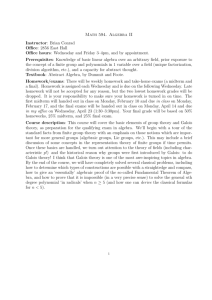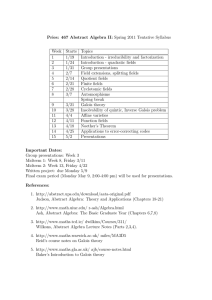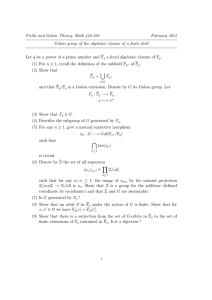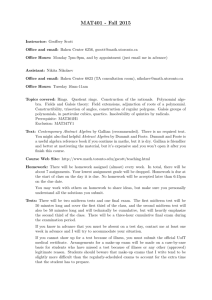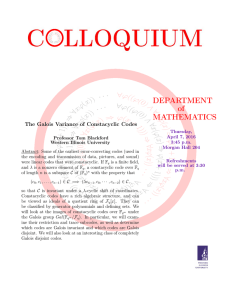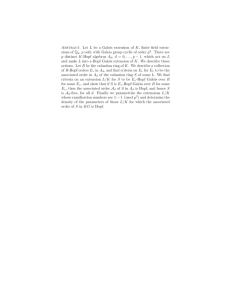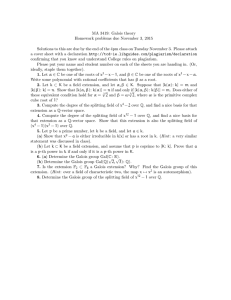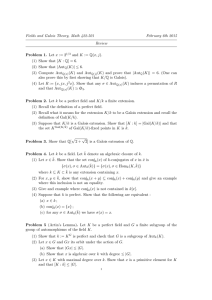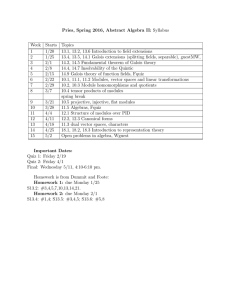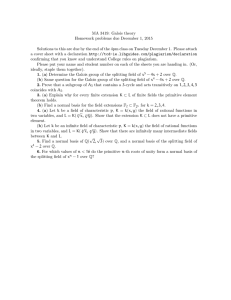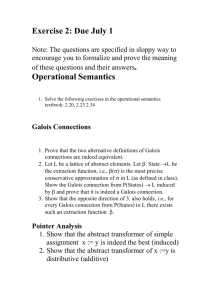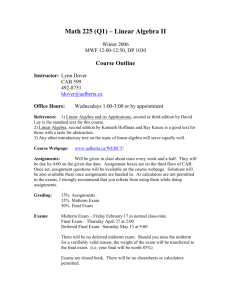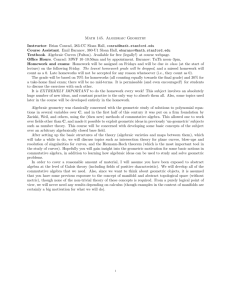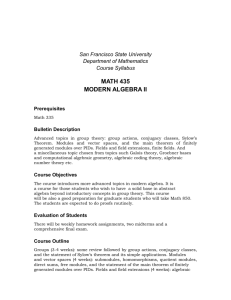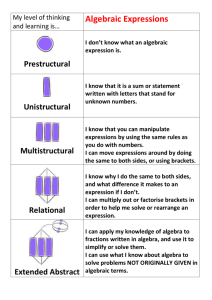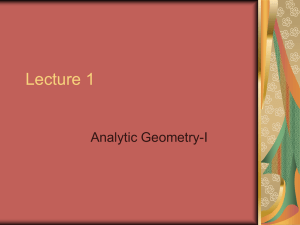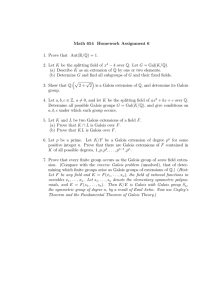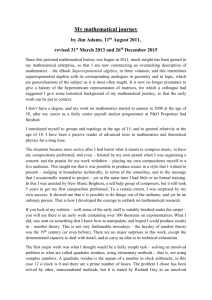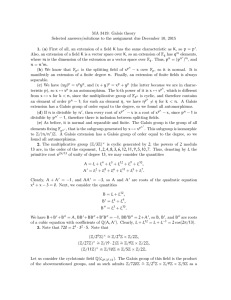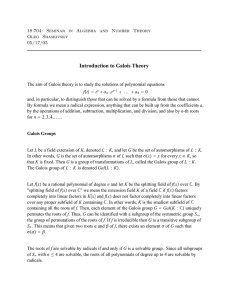Math 121. Galois theory Instructor: Brian Conrad, 383CC Sloan Hall
advertisement
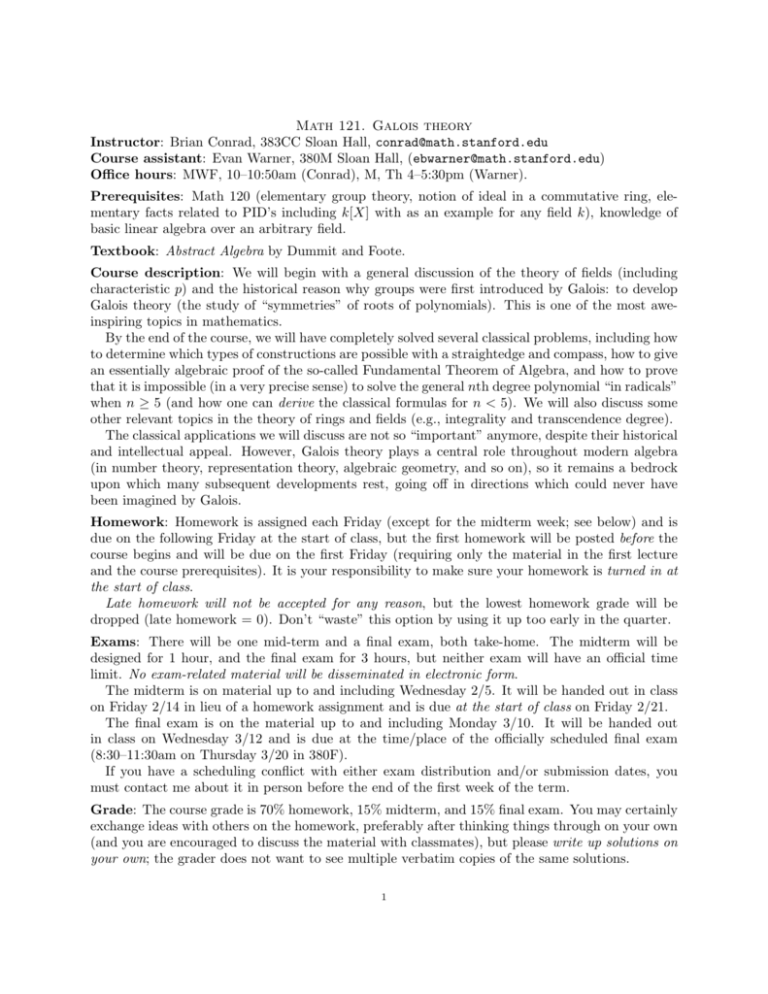
Math 121. Galois theory Instructor: Brian Conrad, 383CC Sloan Hall, conrad@math.stanford.edu Course assistant: Evan Warner, 380M Sloan Hall, (ebwarner@math.stanford.edu) Office hours: MWF, 10–10:50am (Conrad), M, Th 4–5:30pm (Warner). Prerequisites: Math 120 (elementary group theory, notion of ideal in a commutative ring, elementary facts related to PID’s including k[X] with as an example for any field k), knowledge of basic linear algebra over an arbitrary field. Textbook: Abstract Algebra by Dummit and Foote. Course description: We will begin with a general discussion of the theory of fields (including characteristic p) and the historical reason why groups were first introduced by Galois: to develop Galois theory (the study of “symmetries” of roots of polynomials). This is one of the most aweinspiring topics in mathematics. By the end of the course, we will have completely solved several classical problems, including how to determine which types of constructions are possible with a straightedge and compass, how to give an essentially algebraic proof of the so-called Fundamental Theorem of Algebra, and how to prove that it is impossible (in a very precise sense) to solve the general nth degree polynomial “in radicals” when n ≥ 5 (and how one can derive the classical formulas for n < 5). We will also discuss some other relevant topics in the theory of rings and fields (e.g., integrality and transcendence degree). The classical applications we will discuss are not so “important” anymore, despite their historical and intellectual appeal. However, Galois theory plays a central role throughout modern algebra (in number theory, representation theory, algebraic geometry, and so on), so it remains a bedrock upon which many subsequent developments rest, going off in directions which could never have been imagined by Galois. Homework: Homework is assigned each Friday (except for the midterm week; see below) and is due on the following Friday at the start of class, but the first homework will be posted before the course begins and will be due on the first Friday (requiring only the material in the first lecture and the course prerequisites). It is your responsibility to make sure your homework is turned in at the start of class. Late homework will not be accepted for any reason, but the lowest homework grade will be dropped (late homework = 0). Don’t “waste” this option by using it up too early in the quarter. Exams: There will be one mid-term and a final exam, both take-home. The midterm will be designed for 1 hour, and the final exam for 3 hours, but neither exam will have an official time limit. No exam-related material will be disseminated in electronic form. The midterm is on material up to and including Wednesday 2/5. It will be handed out in class on Friday 2/14 in lieu of a homework assignment and is due at the start of class on Friday 2/21. The final exam is on the material up to and including Monday 3/10. It will be handed out in class on Wednesday 3/12 and is due at the time/place of the officially scheduled final exam (8:30–11:30am on Thursday 3/20 in 380F). If you have a scheduling conflict with either exam distribution and/or submission dates, you must contact me about it in person before the end of the first week of the term. Grade: The course grade is 70% homework, 15% midterm, and 15% final exam. You may certainly exchange ideas with others on the homework, preferably after thinking things through on your own (and you are encouraged to discuss the material with classmates), but please write up solutions on your own; the grader does not want to see multiple verbatim copies of the same solutions. 1
